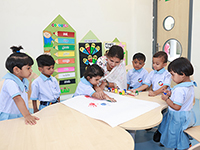“If wealth is lost, nothing is lost; if health is lost, something is lost; but if character is lost, everything is lost.”
As parents and educators, we all want to raise children who are kind, responsible, and strong in their values. But let’s be honest—teaching moral values and character development can sometimes feel like herding cats. Kids today are growing up in a fast-paced digital world where instant gratification is the norm. So, how do we make sure they learn essential life values like honesty, empathy, and responsibility?
The answer lies in integrating moral values and character education into their daily lives. These qualities don’t just shape them into good human beings; they also play a crucial role in their overall child development and future success.
The Foundation of Moral Values:
Moral values aren’t just about saying “please” and “thank you.” Research suggests they are the guiding principles that help children navigate life’s challenges. Whether they’re at home, in primary schools in Nagpur, or on the playground, strong moral values shape their behaviour and decision-making.
Values like:
- Honesty – Teaching kids that truthfulness builds trust.
- Respect – Helping them understand the importance of valuing others’ opinions and personal space.
- Responsibility – Encouraging accountability for their actions.
- Empathy – Teaching them to understand and share the feelings of others.
- Perseverance – Instilling the importance of hard work and not giving up.
Key Moral Values to Instill
Raising a child with good moral values is like planting a tree—you nurture it, water it, and with time, it grows strong and provides shade to others. Here are some essential moral values to focus on as parents as research suggests, parenting plays a significant importance in teaching moral values to the child:
1. Integrity and Honesty
Honesty is the foundation of strong character. Children need to learn the importance of telling the truth, even when it’s difficult. Instead of punishing them for lying, create an environment where honesty is valued and rewarded over punishment.
For example:
- If a child admits to breaking a vase, appreciate their honesty first before addressing the mistake.
- Share real-life stories where honesty led to positive outcomes.
Encouraging honesty helps build trust, confidence, and strong relationships in the long run.
2. Compassion and Kindness
Compassion isn’t just about being nice—it’s about understanding and helping others selflessly. Teaching children small acts of kindness, like helping a classmate, sharing a snack, or simply saying a kind word, helps foster a sense of empathy.
Ways to instil kindness:
- Encourage them to donate toys they no longer use.
- Read books with moral stories about compassion.
- Involve them in community service activities.
Compassionate children grow into adults who make the world a better, more inclusive place.
3. Responsibility and Accountability
Giving children small responsibilities, like feeding a pet, organising their school bag, or making their bed, teaches them the importance of responsibility.
Why is this important?
- They develop independence.
- They understand the consequences of their actions.
- They learn self-discipline.
As children grow, their responsibilities can increase. For example, students in CBSE curriculum schools often have structured assignments and team projects, which help instill accountability.
4. Respect for Others
Respect is a two-way street. When children feel respected, they are more likely to treat others with respect.
How can parents teach respect?
- Encourage polite conversations.
- Teach them to listen actively without interrupting.
- Show appreciation for different cultures and backgrounds.
Respect goes beyond just saying “please” and “thank you”—it’s about valuing diversity, being considerate, and acknowledging other perspectives.
Also Read: The importance of Co-curricular activities at Bangalore International School
Practical Strategies for Character Development
While moral values are important, just talking about them isn’t enough. Kids learn best by observing, doing, and engaging in meaningful activities.
1. Storytelling: The Power of Narratives
Children love stories. Whether it’s fairy tales, real-life anecdotes, or inspirational stories about leaders, storytelling helps make moral values relatable and memorable.
For instance, stories about Mahatma Gandhi’s honesty or Mother Teresa’s compassion can inspire children to adopt similar values.
2. Leading by Example
Children mimic adults. Children will likely follow if parents and teachers demonstrate honesty, kindness, and respect.
For example:
- If you admit your own mistakes, they will learn to own theirs.
- If you treat waitstaff kindly, they will learn to respect all workers.
Your actions speak louder than words when it comes to character building.
3. Encouraging Gratitude
A simple habit of saying “thank you” goes a long way in shaping a humble personality.
Ways to encourage gratitude:
- Keep a gratitude journal where kids write 3 things they are thankful for every day.
- Teach them to express appreciation to family, teachers, and friends.
Gratitude helps children develop contentment and positivity, reducing entitlement and selfish behavior.
4. Role Models & Inspirational Figures
Introduce your child to inspiring role models, such as:
- APJ Abdul Kalam – For his resilience and dedication to education.
- Malala Yousafzai – For her courage and fight for education.
Discuss how these figures overcame obstacles through their strong moral character.
5. Engaging in Community Service
Volunteering teaches children empathy and social responsibility. Encourage them to:
- Participate in clean-up drives.
- Help at animal shelters.
- Distribute food to the needy.
Experiencing the joy of giving helps build compassionate and responsible adults.
The Importance of Social-Emotional Learning (SEL)
Social-emotional learning (SEL) plays a significant role in child development. Schools, especially CBSE international schools in Nagpur, are increasingly incorporating SEL programs to help students manage emotions, set goals, and develop positive relationships. SEL focuses on:
- Self-awareness
- Emotional regulation
- Social skills
- Conflict resolution
When schools integrate SEL with academics, students develop both intellectual and emotional intelligence—essential for personal and professional success.
Building Resilience and Ethical Decision-Making
Life isn’t always fair, and children need to learn how to bounce back from failures. Teaching resilience helps them tackle challenges with a positive mindset. Encouraging kids to make ethical decisions—like choosing right over easy—equips them for the real world.
For example, the best CBSE schools in Nagpur focus on holistic education, ensuring students are prepared not just academically but also morally and emotionally.
Raising children with strong moral values isn’t about giving them a rulebook—it’s about guiding them through real-life experiences, teaching them the importance of character education, and setting an example ourselves. Whether it’s through everyday interactions, structured lessons in top international schools in Nagpur, or personal stories, character development is a lifelong journey.
So, parents and educators, the next time you correct your child or student, remember—you’re not just teaching a lesson; you’re shaping the future. And that’s a responsibility worth embracing.

 Nagpur Campus
Nagpur Campus

















